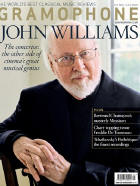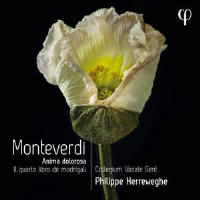Texte paru dans: / Appeared in: |
|
|
Outil de traduction |
|
|
The sensual wrestle between pleasure and pain is at the core of many of the texts set in Monteverdi’s Fourth Book of Madrigals. Recordings must negotiate the same pushpull battle in their choices. Some, like Concerto Italiano’s angsty, fleshy account (Naïve, 12/93), throw the fight, tipping the balance. Others play it out in real time, a back-and-forth of shifting triumphs as we hear from Paul Agnew and Les Arts Florissants (1/15). So where do Herreweghe and his Collegium Vocale land? This is Herreweghe’s second Monteverdi recording on the PHI label – a follow-up to a vivid 1610 Vespers, praised by Gramophone’s David Vickers for its ‘kaleidoscopic dynamism’ (10/18). But the intimate tugging dialogues of Book 4 are a world away from the monumental sacred spectacle of the Vespers, and Collegium Vocale Gent’s signature pristine tone and pinprick precision (showcased, for good and ill, in the group’s recording of Gesualdo’s Book 6 Madrigals – 2/17) seem less obviously suited to the up-close musical grind, gasp and sweat of these secular works. A luxury cast of six solo voices including sopranos Miriam Allan and Barbora Kabátková and tenor Benedict Hymas, often unobtrusively supported by Michele Pasotti’s lute and chitarrone, bring us in tight, the acoustic of Ghent’s Karmelietenkerk supplying the subtlest airbrushing to the luminous sound. It’s very beautiful indeed. The beloved’s eyes in ‘Luci serene’ glow and glitter, while the abandoned shepherdess of ‘Piagn’e sospira’ mourns in textures as softly swelling as the woolly bellies of her flock. The happier young lovers of ‘Io mio son giovinetta’ frolic with delicious lightness, while thoughts turning to the hope of reunion in ‘Longe da te’ are mirrored in rhythms that briefly relax into the sway of dance. But the group’s silvery tone comes close to pallor at times, and after the initial stab of dissonance in the upper voices, the clasp and cling of parting in ‘Ah dolente partita’ feels a little cool. It’s even more noticeable in ‘Che se tu’, whose text describes lovers so indistinguishably, absolutely intertwined that ‘your tears are my blood’. Herreweghe gives the singers plenty of rhythmic freedom and space, but in terms of colour and articulation it all still feels a little business-as-usual, especially from the men – take away the words and this love song could just as easily be a Marian antiphon. All Herreweghe’s habitual care and detail are here but these are works that arguably flourish best with just a little imprecision, coming into focus at the intersection of blurred lines, seizing emotional control just as the conductor surrenders it. |
|




